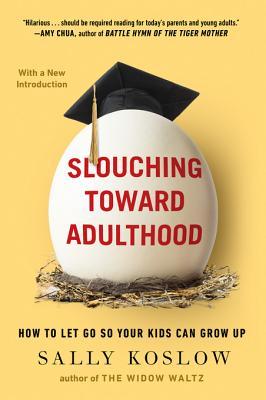
Slouching Toward Adulthood
Observations from the Not-So-Empty Nest
کتاب های مرتبط
- اطلاعات
- نقد و بررسی
- دیدگاه کاربران
نقد و بررسی

April 23, 2012
Novelist and former McCall’s magazine editor Koslow casts a keen eye on the “not-so-empty-nest” phenomenon that besets today’s baby boomer parents. She calls their children “adultescents,” these 22- to 35-year-old “well-educated Americans postponing full maturity and its attendant responsibilities” who return home from college for financial and other forms of support, from laundry to career advice. Koslow shares myriad anecdotes (including ones about her own sons) gleaned from her year’s worth of interviews and research. She is not unsympathetic, acknowledging that indulgent parenting (“we’ve spoiled kids to an unprecedented degree in human history”) feeds the younger set’s frustratingly laid-back attitude, and a depressed economy and slow job market don’t help, either. She notes that subsidizing the kids hurts parents’ own plans for retirement, travel, or just privacy, and expresses frustration with adultescents who don’t see the need for a goal-oriented approach to life. One off-note: the chapter on the risks of delaying pregnancy, which focuses solely on women (don’t men want kids and need to be informed planners, too?). Overall, though, Koslow provides plenty of food for thought for parents and adultescents who want to understand each other and perhaps change things for the better.

May 15, 2012
A witty, provocative study that examines why so many millenials can't seem to launch into adulthood and now find themselves "wandering--if not literally, then psychically." Former Lifetime and McCall's editor-in-chief Koslow (The Late, Lamented Molly Marx, 2009, etc.) is the parent of young adult children for whom "postponing financial independence, jobs, marriage [and] a hovel of [their] own" has become the norm. This postponement has in turn given rise to a new developmental phase that Koslow calls "adultescence." This period (ages 22 to 35), writes the author, is characterized by an "exploration [of self and the world] that seems to go on forever, not unlike the Rolling Stones." A bad economy and severely limited career prospects for young people with no real work experience are only part of the reason for the rise of this new phenomenon. Many adultescents are also taking to heart what their boomer parents have told them since childhood: that they can be and do anything they want because they are special. Consequently, they are creating lives that appear to be breaking all the rules that have characterized the successful, well-ordered lives of their parents. Not only are they not settling for whatever jobs they can find and seeking careers to which they can dedicate their lives; they are also redefining relationships, such as marriage, that once signaled a definitive entry into adulthood. Koslow argues that these hyper-mobile 20- and 30-somethings move across borders and, when necessary, into their parents' homes with equal ease largely because well-intentioned boomers, who secretly "lust for their [children's] attention," have implicitly agreed to the arrangement. However, as Koslow ultimately concludes, neither is able to evolve their roles. Instead, boomers and their offspring remain tied to each other, caught in a never-never land of loving codependency. Observant and bracingly candid.
COPYRIGHT(2012) Kirkus Reviews, ALL RIGHTS RESERVED.

January 1, 2012
Novelist/journalist Koslow draws on her own experience, as well as research and interviews, to talk about a crucial issue: the number of adult children who have returned home to live with their parents. Her book seems less a discussion of why this is happening and what to do about it than a portrait of the adjustments people are making today.
Copyright 2012 Library Journal, LLC Used with permission.

May 1, 2012
It's a growing phenomenonadult children, who have already left the nest, returning to live in their parents' homes again. Drawing on interviews with parents and their adult children and sporting a keen sense of humor, Koslow offers up some explanations as to why kids are, in greater numbers, coming back to roost. Part of it is economic. More and more post-university, entry-level jobs are unpaid (companies preferring to offer internships rather than actual salaries), and unemployment numbers continue to climb. Part of it is shifting educational paradigms. Kids today frequently take longer, sometimes up to two years longer, to obtain a university degree, and U.S. universities are also seeing a steady increase in drop-outs, perhaps because tuition fees also keep climbing. And part of it is social. The period of adolescence is lengthening, creeping into what used to be considered adulthood (Koslow coins the term adultescence, referring to adults behaving and living as if they are preadults). This is a smart book, with plenty of insights and a lively prose style that should keep readers, especially the book's target audience of parents wondering why their grown-up kids are back living in their basements, engaged.(Reprinted with permission of Booklist, copyright 2012, American Library Association.)

























دیدگاه کاربران